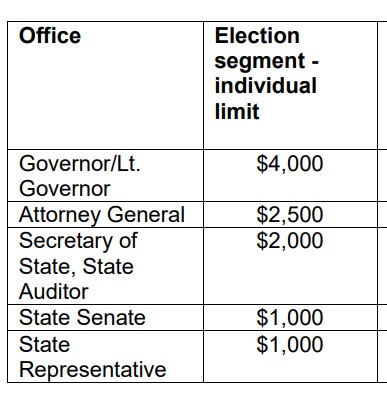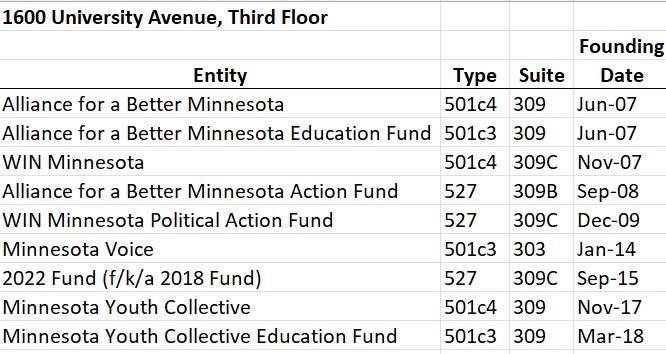The power behind the throne: 1600 University Avenue, St. Paul
The most important address in Minnesota politics is located in St. Paul, but it’s not the state capitol building. The most important address is 1600 University Avenue.
This glass office building, known as Spruce Tree Center, sits at the corner of University and Snelling Avenues and is the headquarters of the nonprofit Alliance for a Better Minnesota and its related entities.

The Alliance is a nonprofit corporation that exists to elect Democrats to office in Minnesota and has not lost a statewide election since it was formed in 2007.
Earlier this month, fundraising reports came out for candidates running for office in Minnesota this year. The reports cover the first three months of the year, and the results were widely reported in state media. Incumbent Governor Tim Walz, a Democrat, was said to be the big winner, pulling in $1 million so far in 2022.
These figures are reported as if they will have any bearing at all on who is elected in the November election. In Walz’s first run for Governor, in 2018, his campaign raised and spent about $5.2 million winning his election. The state’s version of the Democratic party, the Minnesota DFL State Central Committee, raised and spent almost $16 million in 2018.
More quietly, Alliance for a Better Minnesota raised and spent $9.2 million in 2018. Of that amount, Alliance spent $5.4 million campaigning directly against Walz’s Republican opponent, Jeff Johnson, more than the entire fundraising total of the Walz campaign. (By outsourcing the attack ads to the Alliance, Walz could appear to remain above the fray.)
Another purpose-built political fund, the MN Victory PAC, raised and spent an additional $2.7 million to support Walz’s campaign in 2018. This PAC only existed for less than six months, from June to December of 2018.
Walz, Johnson, and other candidates for office are subject to strict limits on the size of donations from individual contributors—

Individual candidates have to raise money at a retail scale, a few hundred to a few thousand dollars at a time. State parties and political funds can raise money wholesale: they are not subject to any limits on the size of individual donations.
Alliance for a Better Minnesota has assembled a formidable machine to scoop up that money. Here are the different pieces, all located on the third floor of 1600 University Avenue:

Alliance for a Better Minnesota has an organization to fit every taste and budget. If you want to donate anonymously and get a tax deduction, then the 501c3 Education Fund is for you. Still want to donate anonymously, but want to fund left-wing politics more directly? Then consider the main 501c4 groups. If you don’t mind your name being out there in the public domain, several PAC’s and Political funds are available, and your money will be used directly in election campaigns.
In addition, both Alliance and WIN operate federal PAC’s in order to participate in congressional and presidential elections. The Alliance spent over $4 million on federal races in 2020.
Alliance’s 2022 fund was formerly known as the 2018 fund. In 2018, the largest single donor was an entity named State Victory Action, which gave $1,872,000. This group was based in North Carolina and appears to have only existed as a funding vehicle for the 2018 election. Tracing the source of this money quickly leads to a series of 501c4 organizations with anonymous donors.
The WIN Minnesota nonprofit and political fund was formerly run by Ken Martin, the current head of the state Democratic party. WIN focuses on large individual donors and public employee unions. In 2018, the largest individual donor to WIN was Alida Messinger, the Rockefeller oil heiress and former wife of the former Minnesota Governor Mark Dayton. She gave $1,150,000 to WIN’s political fund that year. She also gave $100,000 to the 2018 fund.
The largest donor to the WIN political fund in 2018 was the WIN Minnesota nonprofit, which gave $1.5 million. Donations to the nonprofit do not have to be publicly disclosed.
As of the end of 2020, WIN Minnesota’s board of directors consisted of four people: Alliance’s CEO (since 2015) Denise Cardinal, top donor Alida Messinger, progressive activist Jeff Blodgett, and Carrie Lucking. Lucking was Alliance’s CEO from 2011 to 2014, and since November 2021 serves as the Executive Director of Minnesota’s largest teachers’ union, Education MN.
In recent years, the Alliance family has continued to branch out. The nonprofit Minnesota Voice and its partners focus on minority and immigrant communities. Minnesota Youth Collective, as the name suggests, focuses on younger voters.
The network is controlled by a series of interlocking boards of directors, with at least five individuals serving on multiple boards across the nonprofit companies.
A 2012 newspaper article on Alliance outlines its origins and purpose, and describes some of the incestuous relationships between the people involved:
Ken Martin led both the 2012 Fund and WIN before he became DFL Party chairman last year. Jeff Blodgett, formerly of Wellstone Action, took over leadership of the two groups briefly before going on to head President Obama’s Minnesota campaign. Adam Duininck, a former union staffer and Dayton appointee to the Metropolitan Council, took over the 2012 Fund and WIN from Blodgett. He is married to Jaime Tincher, who works in Dayton’s gubernatorial office.
Alliance’s Lucking is romantically partnered with Dayton’s communications chief, Bob Hume. Lucking, who worked for Democrats in the Legislature before she became Alliance’s executive director, said the two consulted an attorney to figure out exactly what they could and could not talk about at home, to keep from violating rules that require them not to coordinate.
Fast forward a decade. Mark Dayton is no longer Governor, but Ken Martin still runs the state Democratic party. Cardinal (Alliance CEO from 2007 to 2011) has returned to lead the organization, again. Blodgett continues to serve as WIN’s board chair. Lucking is the Executive Director of the state teachers’ union and Messinger is still the state’s largest political donor. And all of it is still coordinated from 1600 University Avenue.
We will dig deeper into the Alliance network in future posts.